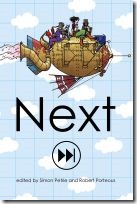 Next is a themed anthology produced by the Canberra Speculative Fiction Guild and edited by Simon Petrie and Robert Porteous. The theme centres around the following concept:
Next is a themed anthology produced by the Canberra Speculative Fiction Guild and edited by Simon Petrie and Robert Porteous. The theme centres around the following concept:
Next suggests ‘change’, perhaps, but it doesn’t have to invoke change, it can simply be an account of cause-and-effect. Sometimes it’s the absence of change, the sense of inevitability, that gives the story its terrible power and its resonance.
Or it might be a rite-of-passage; of invention and exploration; of the testing and transgression of boundaries; or a story laden with doom or hope or just the inevitability of inescapable repetition. Yup, this theme is a theme for all seasons; it’s a cut and come again theme that can mean pretty much whatever people want it to mean.
Now despite what may appear to be a rather open theme this collection hangs together very well. I doffs me hat to the editors for their selections and the collation of the work. There’s some well known writers with absolutely cracking work and some new faces with a good tale to tell. I didn’t love every story( and outside of single author collections I think that’s the norm) but overall I enjoyed the experience. I will pick out the highlights, not necessarily the best stories in the collection but certainly the ones that were most interesting.
Possibly my favourite is the anthology opener The Ninety Two by Claire McKenna.
When the devil died (aged forty-five, heart attack from overtraining, keeled
over on the Nuggets Crossing five kilometres into a ten kilometre run), he was
wearing his number ninety-two guernsey, and even then nobody wanted to
touch it, or him, because if there was ever a man averse to kindness or tenderness
it was Beaufort Kinsey. So they stood in the middle of the road instead, eighteen
dumbfounded men watching him die, and not one lifting a finger to help.
A story that manages to mix small town rural culture,football and horror. Claire is a graduate of Clarion South and I think that this work is extremely polished, and hits just the right tone, never over playing the aspects of bogan culture it so openly shines a light on. I think if you like the sort of work that Karen Warren produced in her Through Splintered Walls, you’ll love Claire McKenna.
I have read editor Simon Petrie’s work before and I did wonder if his penchant for humour and gags influenced the inclusion of Martin Livings’ Cause and Effect, which I wasn’t so sure whether to chortle or groan over. Well written and played very well Mr Livings.
There were some unique takes on fairy tale and myth – Edwina Harvey's Next Cried the Faun is playful with a nudge and a wink and a good follow up to Livings’ piece. By comparison The Wooden Heart by Tracie Macbride, explores darkness, human sexuality and the peril inherent in dealing with the Fae. Prophesy and fairytales don’t always have human benefit at their centre.
Daniel Coleman’s Gambler’s Blues is another tale that should make readers feel uneasy about wishing to find a pot-o-gold at the end of the rainbow, harking back to those stories of the wee folk who are more out to ensnare you, than bring you good fortune.
Vandiemansland,by Ian McHugh and Ned Kelly and the Zombies by Craig Cormick were good explorations of Australian history with speculative fiction elements. Vandiemansland was spoiled to some extent by my viewing of a movie by the same name, they cover similar themes and I felt I may have been desensitised by the viewing of the later to some of the historical aspects of McHugh’s work. In saying that though, I think that McHugh has hit the tone spot on. Cormack's work was an interesting mashup of a much used subgenre with an iconic and much over studied Australian folk hero and it comes out of that mix better than its genre forbears would dictate- a delightful what if.
Gillian Polack’s Someone’s Daughter gave me flashbacks to an M R James adaptation. Polack’s writing style in this piece manages to evoke an otherworldliness, a detachment from reality that compliments the story perfectly.
Stories in the Square and When Money Talks are steampunk infused and give the reader of that subgenre common touchstones with fresh and interesting tales.
Alan Baxter’s Quantum Echoes, displays his growing versatility, stepping away from dark fantasy and giving us dark futurism instead. Helen Stubbs in Casino Five inverts cultural perceptions, and preconceptions, making subtle commentary on workers rights.
It’s a large and diverse collection that I am just scratching the surface of - Janeen Webb has a heartbreaking story and Kris Ashton’s The Midway Hotel hits a little close to home with my long commute to work. I could go on. But what you want to know is – is it worth laying money down for. At $5 from smashwords you are getting a great deal. I’d pay double that easily for the quality found in this collection.
This book was received free of charge, if you would like to purchase a copy head here.
Did you enjoy this review? Would you like to read more? You can subscribe to the blog through a reader,by Email or Follow me on twitter.
